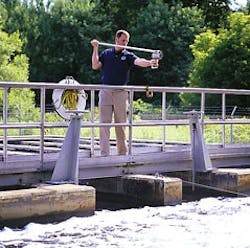The pursuit of perfection is the worthy goal of many businesses. Few, however, achieve it.
But for the water system in Cleveland, Miss., perfection is becoming a habit. Cleveland serves a population of approximately 16,500 through a water and wastewater system consisting of five wells with a combined capacity of 10 mgd, four storage towers and distribution system, 75 miles of water lines, a collection system and 26 lift stations. Since 1992, a private partner, Severn Trent Services , has been under contract to operate the city's water system.
Every March, the Mississippi State Department of Health (DOH) conducts a public water system capacity assessment. Performed by a DOH regional engineer, the routine sanitary survey includes reviews of daily log books, housekeeping and bookkeeping records, budget numbers and long-range plans. Also reviewed are state-mandated reporting and sampling requirements, water quality samples, security vulnerability studies, emergency response and sample site plan, and accompanying reports.
The DOH assesses each system in three areas: technical capacity, managerial capacity and financial capacity. The technical capacity assessment focuses on the operation of the water facility, particularly the proper functionality of the system and its processes. Survey questions include: Was the treatment process functioning properly (i.e., are pH, iron, free chlorine, etc. within acceptable range)? Is the water system overloaded (i.e., serving customers in excess of DOH-approved design capacity)?
The financial capacity assessment focuses on water rates, budgeting, accounts receivable and accounting, and audit reports. Survey questions include: Has the water system raised water rates in the past five years?
The DOH gives a grade of 1 (poor) to 5 (perfect) for each assessment. A perfect overall score of 5 is awarded when a system is graded positively on each capacity assessment.
In both the 2006 and 2007 assessments, the DOH awarded Cleveland's water system a perfect score of 5. It joins the only 19% of the state's water system that scored an overall capacity rating of 5, according to the Mississippi State Department of Health Division of Water Supply.
Keith Christopher, Severn Trent Services project manager and operator, pointed to two other indications of the water system's strong performance. "In August 2005, Hurricane Katrina did a lot of damage in the state, even in cities as far north as Cleveland," Christopher said. "But, while the city endured wind damage and limited power outages, [Severn Trent] maintained a constant flow of water within the system."
According to Brett Moorman, Cleveland's public works director, "The city council has great confidence in the Severn Trent staff, and they've earned it through 15 years of hard work. Our partnership places a continuous high priority on the quality of water delivered to customers. The city, water system employees and Severn Trent Services set a goal each year to achieve a perfect capacity rating.
"This is a partnership that works very well."
